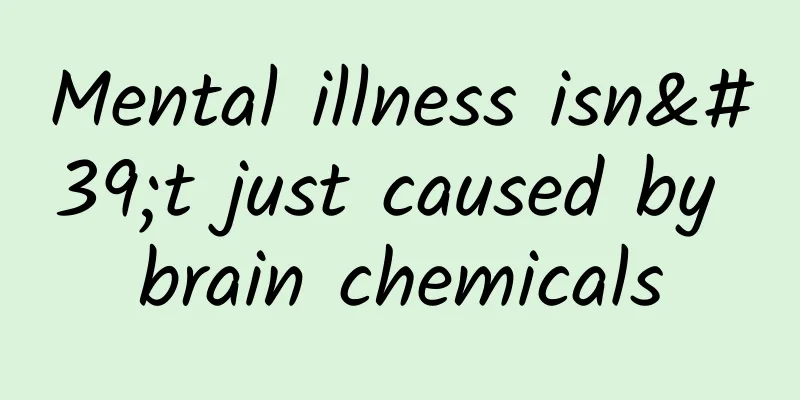Mental illness isn't just caused by brain chemicals

|
Leviathan Press: Generally speaking, people who provide a comprehensive framework for mental illness will conflict with biological reductionists: the former try to integrate social, psychological, and physiological factors, and repeatedly emphasize that the existing biological evidence alone cannot explain everything about mental illness; while the latter believe that mental illness is only caused by an imbalance of chemical substances in the brain (in their view, even factors such as stress caused by the environment can ultimately be reduced to chemical reactions in the brain in a biological sense). One reason why the former is easily misunderstood is that many people understand it as a denial of the factual basis of biology - in fact, it only denies the only causal relationship between physiological and mental illness. In my opinion, the difference between the two does not seem to be so obvious: after all, the view that it must be reduced to biological facts is also equivalent to acknowledging the influence of the external environment. In the previous article "It's time to reflect on the drawbacks of drug treatment of mental illness", many readers misunderstood his view as stopping taking psychotropic drugs. It should be noted that "questioning the efficacy of psychotropic drugs" and "stopping/opposing psychotropic drugs" are completely different things. Whitaker aims to emphasize that the medical community should not ignore the influence of factors such as the external environment. As the saying goes, correlation is not causation, but unfortunately, many people who are used to either this or that have crudely causally ... Danny Lavery’s advice podcast Big Trouble Little Emotions is always a favorite of mine, and the one I listened to this morning touched on the many causes of depression. The advice seeker was a frazzled, exhausted lawyer who had been working alone from home for months during the pandemic and was beginning to feel that life was losing its meaning. He began looking for advice on how to cope with the frustrating fact that for the next forty or sixty years he was doomed to work mechanically, fill his stomach, exercise hastily, and then fall into bed. Danny Lively immediately realized that the client was facing a problem that was both personal and universal. Many had been alone at home for more than 15 months, and the lack of stimulation, meaningful social interaction, and things to look forward to could make almost anyone feel very depressed. Inkoo Kang, the guest host of this episode, suggested that the client seek out some new and intellectual challenges in his daily life to recapture the joy of his school days, when he had interesting classes and plenty of free time. As an adult with a clear understanding of their own mortality (and knowing that they are just a wage earner for capitalism), as a depressed adult struggling to dig out of a bad job, it is difficult to eliminate the pain of life and death. Lively also said that when patients are obsessed with solving such existential problems, they will develop a habit of taking psychotropic drugs to relieve stress. I loved the responses from Lavery and the guest host, which reflected that when it comes to conditions like depression, there is no clear line between mental illness and misery. © The Conversation At one point, Kahn described depression as a “biological void” and suggested that clients consider antidepressants to stabilize their moods. I worried that she was going to say that depression is caused by an imbalance of chemicals in the body, but that’s not what Kahn meant at all. Rather, her point was that despite the frustrating life and work situations of the people seeking advice, these external factors can still cause visible physiological damage to the person. Lavery then made it clear that medication wouldn’t solve the problems the client was facing in their life, but it could make them feel better and make a clear decision about what to do next. Medication is certainly one of the recommended solutions, as the cost of treatment does not seem to impose too much financial burden on the client. However, there is no evidence that the client's consciousness or mind is the only or main factor in the development of depression. Personalized treatment may make the client better off than he is now, but for long-term and effective treatment, the client's living environment may have to change. The advice seeker wrote that she missed her waitressing days and hanging out with her boyfriend. It’s not hard to understand why: a fast-paced, hands-on job that involves a lot of interaction with people is often rewarding and grounding, and nothing gives life more meaning than spending quality time with the ones you love. After listening to Lavery and Kahn discuss the letter, I pulled out my headphones and breathed a sigh of relief. They acknowledged both the biological and social causes of depression and did not frame them as opposites or treat the two causes as incompatible therapies. This kind of analysis is not uncommon, but discussions that acknowledge that both internal and external factors contribute to depression are rare, with most people assuming that depression is either an innate chemical imbalance or caused by capitalism—an affliction that would only exist in a utopia. In the past few decades of publicizing biological explanations for mental illnesses like depression, anxiety, and ADHD, I often encounter people claiming that these mental illnesses are "caused by chemicals." I also often encounter popular science writers who love to discuss which part of the brain "controls" things like memory, empathy, or even something as big and complex as personality. Recently, someone on Twitter tried to tell me that a condition like borderline personality disorder (a condition caused by emotional and relationship patterns rather than biological causes) is a "brain disease." It’s not hard to understand why biological explanations for mental illness are so appealing to me. Saying that a person’s moodiness or difficulty sleeping has a biological cause seems to let the person off the hook morally or ethically, because whatever suffering they are experiencing is due to their mental illness. We live in a society where hard work is seen as noble, and a lack of motivation, inattention, or stagnation is seen as shameful, immoral laziness. And people with depression (or anxiety or ADHD) are not at fault. They just can’t help themselves. The chemicals in their bodies are out of balance. They are not born that way, they just need medication to fix the problem. People are drawn to biological explanations of behavior and emotion in part because it feels more “scientific” than talking about sociology or psychology. Economic institutions, family relationships, cultural traditions, and media messages are hard to document objectively, and their effects are hard to study thoroughly. But scanning a patient’s brain and analyzing their saliva for stress hormones is easy, or so it seems. Some studies have shown that the public perceives neuroimaging techniques as far more credible and reliable than psychology studies that don’t include brain scans, even when the two studies are functionally identical. And the reality is that most brain scan data has limited availability, and low reliability and reproducibility. You see, brain imaging isn’t simple. With the right adjustments and data cleaning steps, you can create effects in brain scan studies that don’t really exist, such as finding evidence of cognitive empathy in the brains of dead fish. (www.wired.com/2015/02/people-willing-dismiss-evidence-psychology-brain-science/) (today.duke.edu/2020/06/studies-brain-activity-aren%E2% 80%99t-useful-scientists-thought) (www.smithsonianmag.com/smart-news/new-study-calls-reliability-brain-scan-research-question-180959715/) Biochemical and neuroscience research is still in its messy infancy. Many of its findings cannot be replicated, entire research projects have been shut down by buggy, crap software, and most of the credible findings describe chemicals and brain regions that are already well known to psychologists. In other words: neural and physiological data can provide a lot of data on the scientific principles of human thought processes, but for now, they are difficult to explain the mechanisms behind mental illness. (www.sciencealert.com/a-bug-in-fmri-software-could-invalidate-decades-of-brain-research-scientists-discover) © Verywell Mind Scientifically, it is not interesting or meaningful to observe an autistic child who hates eye contact being forced to make eye contact and the threat-related centers in their brain "lighting up." We can already see from their behavior and emotions that eye contact is extremely painful and threatening to them. Similarly, finding that a brain chemical (like dopamine) is involved in decision-making is not that remarkable. There must be a part (and chemical) in the brain that is involved in making these processes happen. (www.sciencedaily.com/releases/2005/03/050309151153.htm) (journals.plos.org/plosone/article?id=10.1371/journal.pone.0030844#:~:text) The brain is a biological structure. Consciousness is a process expressed by the brain. Whether you study neuroscience about attitude change, love, fear, daydreaming, listening to music, or browsing Batman on Wikipedia, you will always find biological processes involved. But this does not mean that there are chemicals in the brain for "browsing Batman on Wikipedia" or lobes for "listening to electronic music". It just means that all human psychological processes are generated by the brain. For some reason, many non-scientists (including many science journalists) believe that there are biological markers for psychological processes, and that these psychological processes are produced by these biological markers. When someone feels competition, this part of the brain "lights up", so this part of the brain produces racism. This is the chemical involved in exerting will, so will must be caused by many chemicals. (aninjusticemag.com/in-the-brain-of-a-racist-a-lousy-prefrontal-cortex-8c13ead4d25f?gi=e525427c13f3) (www.thingraylinecrossfit.com/blog/willpower-and-dopamine-take-charge-of-your-brain) By thinking in this way, we can conclude that depression is caused by a lack of serotonin, anxiety is caused by a lack of serotonin and gamma-aminobutyric acid (GABA), and ADHD is caused by a lack of dopamine. To think that depression is “caused” by a lack of serotonin or that anxiety is “caused” by a need for more GABA is like thinking that digestion is “caused” by too much stomach acid. Rather, emotions and thoughts are things our brains do, a process the body can express, just as digestion is a process the digestive organs participate in. Digestion is done by the body's stomach, intestines, gut flora, and stomach acid, but not by any one part of the body or chemical. Digestion changes depending on what our bodies need at a given time, what we eat, and what we do. We can study digestion by looking at the physiological mechanisms that digestion relies on: examining a person's stool sample, checking their throat for acid reflux, analyzing their blood sugar levels, etc. © Healthline But when we look at the process of digestion and markers of that process, we're not looking at the entire digestive process, and we're obviously not looking at all the variables that could have an impact. For example, we don't think of constipation as being caused by a blockage in the movement of stool through the intestines. That's actually how we define constipation. Hard stools can be caused by changes in diet and stress levels, as well as dehydration. I hope you can forgive my simplistic metaphor, but the same is true of the brain, the mind, and the emotions and drives that the brain produces. The mind is a process expressed by the brain. It requires a brain (or something like a brain) to produce it, but that doesn't mean the mind is a static thing located in the brain. We can’t observe the mind, but we can observe the brain to understand how the mind is expressed in the present moment. Blood flow, stress hormones, response to drugs, and behavior can help us understand how the mind is changing, but they can’t give us a complete picture or directly tell us why it is happening. Generating emotions and drives is what our brains do; depression is a mental state that the brain uses serotonin to produce. But why do depressed people have insufficient serotonin? Is it in their genes or is it that their bodies suddenly lose a lot of serotonin? Or is it both? If a person becomes depressed in a depressing environment, can we really say that they are sick? Maybe it's their brain responding to the environment in a smart way, just like a hungry person's digestion slows down. (www.scientificamerican.com/article/depressions-evolutionary/) When you criticize the biomedical model of mental illness like this, it can offend people. Some people think that any criticism of neuroscience and psychiatry is a conspiracy of science and technology. But pointing out that the labels of mental illness are socially imposed and that neuroscience is flawed is not the same as saying that depression, anxiety, or even paranoia are all fake. Noting that anxiety disorders can be caused by external and social factors doesn’t mean we should stop people from taking medication to treat their illnesses. As Danny Lavery and Inko Kang mentioned on this show, for mental illnesses, external medication and internal spiritual counseling work best together. Unfortunately, people are still obsessed with a biological understanding of mental health, and react violently when that understanding is challenged. Recently, my friend and colleague Jesse Meadows wrote a story about the mechanisms behind ADHD and its common treatments, such as the neuroleptic drug Ritalin. The most common explanation for "causing" ADHD is a lack of dopamine. As a neurotransmitter, dopamine is involved in a range of psychological activities and is widely present in multiple brain regions. However, most popular science articles focus on the role of this substance in goal setting, attention, and motivation. The dopamine theory holds that ADHD patients have difficulty concentrating and are always in a state of excitement because they lack sufficient dopamine to allow them to get the pleasure provided by the "reward system" after completing their goals. The solution, then, is to provide a neurostimulant drug to make up for the lack of intrinsic motivation. Patients are sometimes told that the ultimate test for ADHD is their response to stimulant drugs such as Ritalin: if the drug can help you focus and work efficiently, then it proves that you really need it. As Jesse's article states, there are still many controversies about the above explanation. First, psychiatrists' explanation of "dopamine deficiency" is actually lacking sufficient basis. It is more like a metaphor than a biological fact. Although neurotransmitter activity sounds objective and scientific, we cannot measure it in the patient's brain at present. If someone has classic ADHD symptoms (a time management loser, a bedroom piggy bank, or someone with AE), there is no reliable biological way to diagnose them by measuring dopamine levels. We don’t know for sure if ADHD is caused or triggered by differences in dopamine levels. Taking Ritalin and feeling more energetic and focused is actually… normal. It’s like drinking coffee and feeling energized or taking drugs and feeling high. When Jessie initially shared her research online, she was flooded with angry criticism and backlash, mostly from so-called “ADHDers,” most of whom were actually screwing up their lives because they were “lazy” and “disorganized” (just like many real ADHDers are). They breathe a sigh of relief when they discover there is a named disease and a possible biological cause for their "disability" - it means their badness is not their fault. Although people are often criticized for taking psychiatric drugs, they still actively defend themselves when their reasons for taking the drugs are questioned. This is not what Jesse intended, but many people misunderstand the criticism of psychiatry as a way for patients to stop taking drugs and drink coffee, so it's no wonder that some people act so ridiculously. Many people with mental illness embrace biological explanations for their conditions because they provide a relatively easy way out of social injustice. Unfortunately, however, these biological explanations also serve as an excuse for some people to escape stigma by suggesting that people with a particular diagnosis are the same type of person who is incapable of making decisions about their lives or taking responsibility for their actions, just like people with mental illnesses. (www.madinamerica.com/2018/03/psychosocial-explanations-psychosis-reduce-stigma-study-finds/) Rather than being branded as "evil," people would rather be labeled "defective." But it would be better to stop defining certain traits as completely flawed and instead look at the broken social context in which they exist. As a social psychologist who has lived with mental illness, I know that depression is real, both scientifically and personally. The pain of sensory overload is no less than any physical trauma. And psychotherapy and medication are important ways to promote a person’s overall health. I know that not all of the different emotions and behavioral responses that the brain produces are acceptable, and certainly not all of them are pleasant. As an autistic person, most of my suffering comes from the noisy, unforgiving, and inflexible mental world that I inhabit. I would be lying if I claimed that there was no medication for this type of mental state. If taking just one medication could eliminate the crying, screaming, self-harming mental breakdowns in my life, I'd probably consider taking it. But rather than searching for a medical cure, I would rather spend my time advocating for autism’s liberation at a societal and structural level. I know that in my case, and in many neurodiverse people, the biomedical model of disease does not offer a path to redemption. I don’t want every abnormal behavior to be whitewashed away. Instead, I long to be accepted and comfortable being myself. As the counselor wrote to Danny Lavery, my problems are as social, economic, and contextual as they are neurological. When I have no choice but to pour my full passion into my work, I become even more stressed and exhausted. If a person with ADHD is working 60 hours a week in a work environment where they have no fun and their disabilities are not taken seriously, it's no wonder they need stimulants to survive. Our brains may be the site of pain caused by rejection, anxiety, or sensory overload, but to understand the causes of these pains, we should focus on the environment outside the brain, not inside it. By Devon Price Translated by Pharmacist Proofreading/Yord Original article/devonprice.medium.com/no-mental-illness-isnt-caused-by-chemicals-in-the-brain-1b01d6808871 This article is based on the Creative Commons Agreement (BY-NC) and is published by Pharmacist on Leviathan The article only reflects the author's views and does not necessarily represent the position of Leviathan |
<<: What are the unknown inside stories of hospitals?
>>: The Diexi Earthquake That Cannot Be Forgotten
Recommend
Science Museum丨Why can we hear mosquitoes buzzing when the lights are turned off, but can’t hear them when the lights are turned on?
Summer is coming, and as the temperature rises, m...
Will there be no mosquitoes if you live in a high-rise building? Mosquito: How high can you guess I can fly?
"If you live high enough, there will be no m...
What can save you? Enterprise information security
In the past year, information security incidents ...
Novel placement TikTok advertising landing page format!
Today an advertiser said, I want to promote my no...
The fake Xiaomi is just a smokescreen. The real rivals of Zhiji L6 are BYD Han and Zeekr 001
Equipped with a semi-solid-state battery and with...
Screen resolution goes back to the last century! US military Windows 10 tablet exposed
The US government has recently announced that it h...
Chifeng Mini Program Development Company, how much does it cost to develop a chemical mini program?
There is no fixed price for the development of th...
If you mistakenly download these ten apps, your phone may be deeply infected with viruses. Here are five warning signs:
Smartphones have become a necessary communication...
Are the “duckbill forceps” used for gynecological examinations really “modern female torture devices”?
If you were to ask what examination is the most t...
Why do batteries become as “afraid of the cold” as you are in winter?
Produced by: Science Popularization China Author:...
Toy Mini Program Franchise Price Query, How much is the Toy Mini Program Franchise Price?
How much does it cost to join the Dongguan Toys M...
2015 Chinese Programmers Survival Report—How miserable life is!
Coding at work, coding overtime, and falling asle...
Toyota's net income fell in fiscal 2017, and its operating profit may fall by 20% this fiscal year
On May 10th local time, Toyota Motor Corporation ...
CDN acceleration server, CDN video service acceleration principle
cdn acceleration server, CDN video service accele...
How to promote APP in 2018? Complete guide to explaining channel promotion!
Whether you are a rookie who has just entered the...









